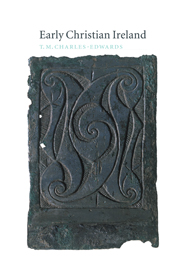Book contents
- Frontmatter
- Contents
- List of maps
- List of tables
- List of figures
- Acknowledgements
- Abbreviations
- A note on pronunciation
- A note on the Chronicle of Ireland
- Introduction
- 1 Ireland in the seventh century: a tour
- 2 Irish society c. 700: I. Communities
- 3 Irish society c. 700: II Social distinctions and moral values
- 4 Ireland and Rome
- 5 Conversion to Christianity
- 6 The organisation of the early Irish Church
- 7 Columba, Iona and Lindisfarne
- 8 Columbanus and his disciples
- 9 The Paschal controversy
- 10 The primatial claims of Armagh, Kildare and Canterbury
- 11 The origins and rise of the Uí Néill
- 12 The kingship of Tara
- 13 The powers of kings
- 14 Conclusion
- Appendix: genealogies and king-lists
- Glossary: Irish and Latin
- Bibliography
- Index
3 - Irish society c. 700: II Social distinctions and moral values
Published online by Cambridge University Press: 11 September 2009
- Frontmatter
- Contents
- List of maps
- List of tables
- List of figures
- Acknowledgements
- Abbreviations
- A note on pronunciation
- A note on the Chronicle of Ireland
- Introduction
- 1 Ireland in the seventh century: a tour
- 2 Irish society c. 700: I. Communities
- 3 Irish society c. 700: II Social distinctions and moral values
- 4 Ireland and Rome
- 5 Conversion to Christianity
- 6 The organisation of the early Irish Church
- 7 Columba, Iona and Lindisfarne
- 8 Columbanus and his disciples
- 9 The Paschal controversy
- 10 The primatial claims of Armagh, Kildare and Canterbury
- 11 The origins and rise of the Uí Néill
- 12 The kingship of Tara
- 13 The powers of kings
- 14 Conclusion
- Appendix: genealogies and king-lists
- Glossary: Irish and Latin
- Bibliography
- Index
Summary
Early Christian Ireland was a highly inegalitarian society. Indeed, the original Introduction to the Senchas Már expressed horror at the very notion of social equality. Yet, although status was all-important, the early Irish laws explicitly recognised that there were several ways to achieve high rank. This acknowledgement that there were different sources of high status made it much easier to give a high social value to verbal and artistic skills and to learning; for that reason, the approach to status was a principal foundation-stone of early Irish culture. As we shall see, the treatment of the subject in the laws suggests that men whose own claim to high rank was through their learning used that very same learning to impose a comprehensive view of social status.
In any inegalitarian society there is a need to have a comprehensive hierarchy of status, namely a system by which one person's status can be related to anyone else's. If rank is a essential part of any person's social identity, no one can be left outside the system. When someone was injured or killed, compensation was due, and the value of the compensation, including the conditions in which an injured person was treated, depended on the status of the victim and the rank of his kinsmen and lord. But if there is division of labour and therefore diversity of social function, the different functions performed by people are likely to be incommensurable.
- Type
- Chapter
- Information
- Early Christian Ireland , pp. 124 - 144Publisher: Cambridge University PressPrint publication year: 2000



